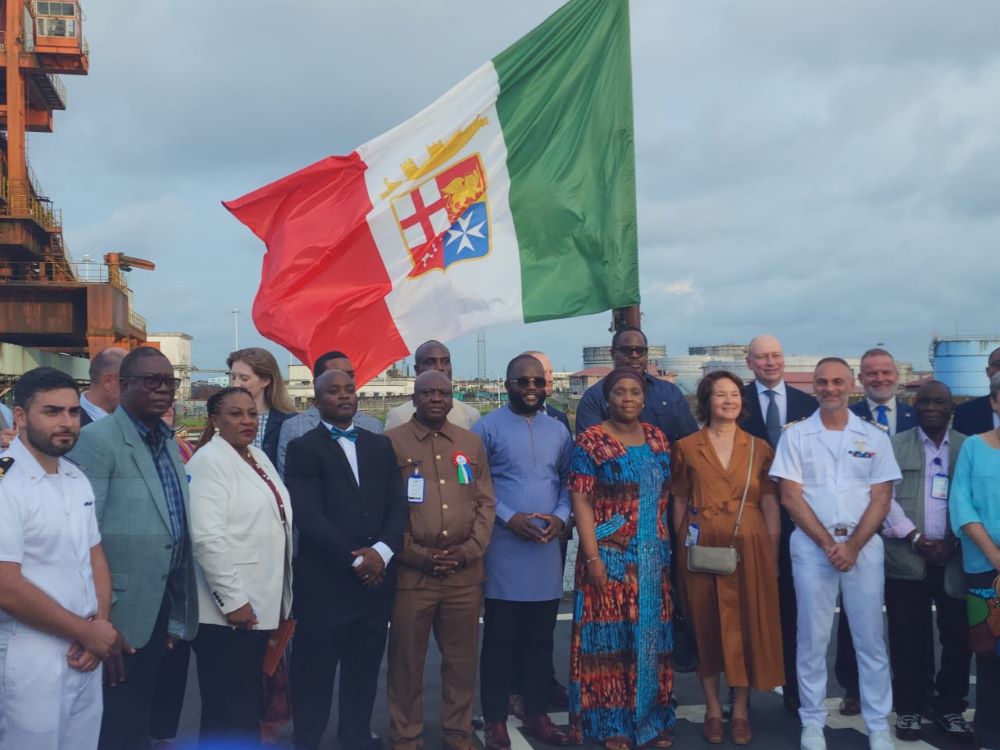The recent visit of the Italian Naval Patrol Vessel “Comandante Borsini (P491)” to the Freeport of Monrovia, Liberia, reflects an ongoing commitment to enhancing maritime security in the Gulf of Guinea. This visit, which took place on November 8, 2024, marked an important engagement between the Italian Navy and the Liberian government. Captain Ugo Giglio, the Commander of the vessel, highlighted the significance of this collaboration at a ceremony attended by key figures, including the National Port Authority’s Managing Director, Hon. Sekou A.M. Dukuly, and various members of the diplomatic community. Such visits are instrumental in fostering partnerships that aim to mitigate maritime threats in a region vulnerable to piracy, smuggling, and other illicit activities.
Captain Giglio provided insight into the two significant maritime exercises conducted by the Italian Navy annually in this area: “Obangame Express” and “Grand African Nemo.” These initiatives are designed to bolster maritime security and cooperation among the navies of coastal nations in the Gulf of Guinea. The exercises not only focus on security operations but also involve humanitarian aspects, including the delivery of medical supplies and educational toys to local communities, thereby underscoring the Italian Navy’s commitment to supporting regional populations and enhancing their well-being alongside security endeavors.
European Union Ambassador to Liberia, Nona Deprez, characterized the arrival of “Comandante Borsini” as a pivotal moment in the EU’s determination to deepen its ties with Liberia and West Africa. She emphasized the multifaceted threats present in the Gulf of Guinea, such as piracy and armed robbery, as well as the impacts of illicit fishing, drug trafficking, and the broader implications of climate change on maritime activities. Amb. Deprez underscored that naval operations under the EU’s common security and defense policy focus on coordinated maritime presences, which aim to utilize member states’ naval capabilities effectively to ensure stability and security in the region.
The EU’s support for maritime security extends into operational frameworks like the Yaoundé Architecture, which aims to enhance collaborative security efforts among West African nations. Since introducing the Maritime Security Presence concept in 2021, the EU has bolstered its position as a strategic partner in the region, highlighting the importance of an integrated approach toward addressing maritime challenges. By strengthening cooperative frameworks, the EU aims to create a more secure maritime environment conducive to trade, economic growth, and regional stability.
In his remarks, NPA Managing Director Hon. Dukuly expressed gratitude for the Italian Navy’s and EU’s efforts to combat piracy, trafficking, and pollution in the Gulf of Guinea—a region that faces numerous maritime threats impacting economic vitality. He reinforced the necessity for substantial government support to develop port infrastructure, which is crucial for Liberia’s economic gateway. Hon. Dukuly acknowledged the EU’s financial commitment of 20 million United States dollars to the Safe Seas for Africa program, emphasizing that such investments are vital for enhancing the capabilities of regional actors working to secure maritime spaces.
Additionally, the presence of various international diplomatic representatives and governmental leaders at the ceremony further illustrated the broad interest and commitment to regional security. The collaboration among nations and organizations is fundamental in safeguarding oceans and preserving marine ecosystems for future generations. Through their concerted efforts, stakeholders in West Africa can create an environment of security that not only combats existing threats but also promotes sustainable development and maritime stewardship across the region. The engagement of entities like the EU and Italy represents a collective approach to addressing the complexities of maritime security, which requires robust cooperation among all affected nations.


